In the Land of the Cathari #
In contrast to the Catholic Church, the Cathari had but one sacrament, the Consolamentum, or Consolation. This involved a brief spiritual ceremony to remove all sins from the believer and to induct the believer into the next higher level, ready for heaven. Contrary to the Roman Catholic sacrament of Penance, the Consolamentum could be taken only once. Thus, it was often received shortly before death to make sure that the person would be free of sin when dying.
The Cathari did not believe in the catholic church for various reasons: There was the moral decadence and corruption of papal administration and of priests, sinning and enjoying life, while paying little attention to the poor and sick. The Cathari did also not believe that god was almighty (since he allowed tragedies and atrocities).
The growing number of proponents of Chatharism with simpler rules made the Catholic Church increasingly nervous.
In 1198 pope Innocent III came to power and was bent on getting rid of the Cathari. Some semi-peaceful attempts failed. Eventually, two crusades were conducted against the Cathari. It came to the massacre of Beziers on July 22, 1209. This was the first major military action of the first Albigensian Crusade. 20.000 people, independent of age and sex, were killed by the Catholic crusaders, a first sign of how vicious the Cathari would be persecuted. They did continue to fight, many withdrawing to castles built in almost inaccessible places in the mountains.
The official war ended in the Treaty of Paris (1229), by which the king of France took most of the possessions and land of the house of Toulouse and of the Viscounts of Béziers and Carcassonne.
In spite of the wholesale massacre of Cathari during the war, Catharism was not yet extinguished. The Inquisition was established in 1234 to uproot the remaining Cathari. Operating in the south at Toulouse, Albi, Carcassonne and other towns during the whole of the 13th century, and a great part of the 14th, it succeeded in crushing Catharism as a popular movement and driving its remaining adherents underground. Cathari who refused to recant were hanged, or burnt at the stake.
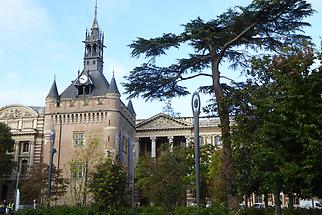 Capitole
Capitole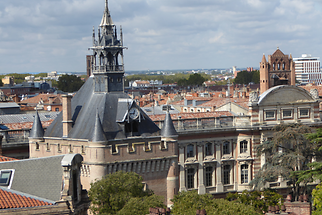 View of Capitole
View of Capitole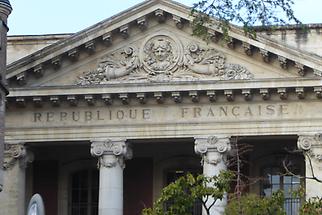 Part of Capitole
Part of Capitole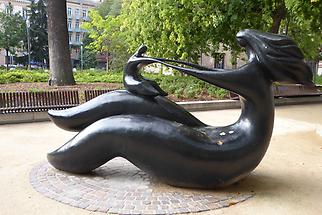 Sculpture
Sculpture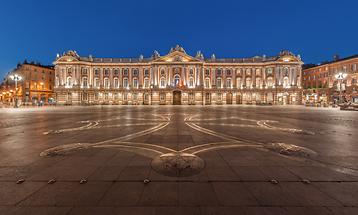 Capitole by night
Capitole by night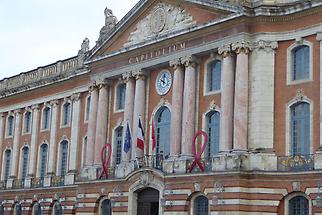 Part of Front of Capitole
Part of Front of Capitole- Convent of Jacobins
- Tower of Dominican Church
- Inside Dominican Church
- Dominican church inside
- Looking up
- Thomas of Aquin
- Basilica Saint Sernin
- Tower of Saint Sernin
- Above main entrance
- Sculptures at main entrance
- Inside Saint Sernin (1)
- Inside Saint Sernin (2)
- River Cruise
- On the river
- Pont Neuf
- Part of Pont Neuf
- School of Fine Arts
- Approaching a lock
- A lock
- Open Lock
- On the canal
- A problem of size
- Entering a side canal
- Houseboats
- Carcassonne
- Main entrance to fortification
- Welcome by medieval woman
- Two rings of fortification
- Inner fortification
- Walk on the walls of the fortification (1)
- Walk on the walls of the fortification (2)
- Walk on the walls of the fortification (3)
- View of City
- Basilica des Saints Nazaire
- Walking to the Basilica
- Basilique des Saints Nazaire
- Inside the Basilica (1)
- Inside the Basilica (2)
- Inside the Basilica (3)
- Mirepoix (1)
- Mirepoix (2)
- Mirepoix (3)
- Mirepoix(4)
- Foix
- Fortress of Foix
- Foix with castle
- Castle Foix at night
- Monts gur
- Village of Monts gur
- Cave of Nivaux
- Entrance of Cave
- Queribus (1)
- Queribus (2)
- Queribus (3)
- Queribus(4)
- Windmill in Cucugnan
- Near Cucugnan
- Cactus figs near Cucugnan
- Peyrepertuse from Cucugnan
- Peyrepertuse - getting closer
- Start of walk
- Half way up
- Peyrepertuse
- Perpignan (1)
- Cityhall of Perpignan
- Venus (1)
- Venus (2)
- An optician wants to catch your view
- Sculpture close-up
- Red marble
- Cathedral in Perpignan
- Tower of Cathedral
- Entrance to cathedral
- Nave of Cathedral
- Head of a Moore
- Inside the church
- Impressive Christ (1)
- Impressive Christ (2)
- Collioure (1)
- Collioure (2)
- Collioure (3)
- Collioure (4)
- Collioure (5)
- Collioure (6)
- Collioure (7)
- Collioure (8)
- Collioure (9)
- Fish at tip of harbour
- Cathedral of Elne
- Elne (1)
- Elne (2)
- Church Tower in Elne
- Inside the church in Elne
- Cloister of Elne (1)
- Cloister of Elne (2)
- Cloister of Elne (3)
- Sculptures in the Cloister (1)
- Scultures in the Cloister (2)
- Cloister and Tower
- Saint Martin du Canigou
- The Tower (1)
- The Tower (2)
- Looking back into the valley
- Saint Martin cloister and church
- Inside Saint Martin church (1)
- Inside Saint Martin church (2)
- Walk through abbey Saint Martin (1)
- Walk through abbey Saint Martin (2)
- Walk through abbey Saint Martin (3)
- Walk through abbey Saint Martin (4)
- Walk through abbey Saint Martin (5)
- Walk through abbey Saint Martin (6)
- Walk through abbey Saint Martin (7)
- Walk through abbey Saint Martin (8)
- Walk through abbey Saint Martin (9)
- Road from abbey to village
- Back in civilization
- Saint Michel de Cuxa (1)
- Saint Michel de Cuxa (2)
- Saint Michel de Cuxa (3)
- Crypta of Saint Michel
- Orgues (1)
- Orgues (2)
- Orgues (3)
- Orgues (4)
- Orgues with background
- Orgues (5)
- Fontfroid, entrance area
- Lioness
- Lion
- View into cloister of Fontfroide
- Cloister of Fontfroide (1)
- Cloister of Fontfroide (2)
- First glance of Tower of Fontfroid
- Tower of Fontfroid
- Inside church of Fontfroid (1)
- Inside church of Fontfroid (2)
- Inside church of Fontfroid (3)
- Sleeping hall
- Garden of Fontfroide
- Modern Montpellier (1)
- Modern Montpellier (2)
- Modern Montpellier (3)
- En route to Saint Guilhem (1)
- En route to Saint Guilhem (2)
- En route to saint Guilhem (3)
- En route to saint Guilhem (4)
- Reaching Saint-Guilhem-le-Desert (1)
- Reaching Saint-Guilhem-le-Desert (2)
- Reaching Saint-Guilhem-le-Desert (3)
- Stroll through Saint Guilhem (1)
- Stroll through Saint Guilhem (2)
- Stroll through Saint Guilhem (3)
- Stroll through Saint Guilhem (4)
- Stroll through Saint Guilhem (5)
- Stroll through Saint Guilhem (6)
- Church of Saint Guilhem (1)
- Church of Saint Guilhem (2)
- Inside church of Saint Guilhem
- Cloister of Saint Guilhem (1)
- Cloister of Saint Guilhem (2)
- Cloister of Saint Guilhem (3)
- Mountain behind Saint Guilhem
- La Couvertoirade
- In La Couvertoirade (1)
- In La Couvertoirade (2)
- La Couvertoirade (1)
- La Couvertoirade (2)
- La Couvertoirade (3)
- La Couvertoirade (4)
- La Couvertoirade (5)
- Former Fortress of Templars
- Cross of Templars
- Albi and cathedral
- Near cathedral entrance
- Inside cathedral (1)
- Inside cathedral (2)
- Tower,garden,river
- Reflections in river Tarn
- Bridges over the Tarn (1)
- Typical Albi